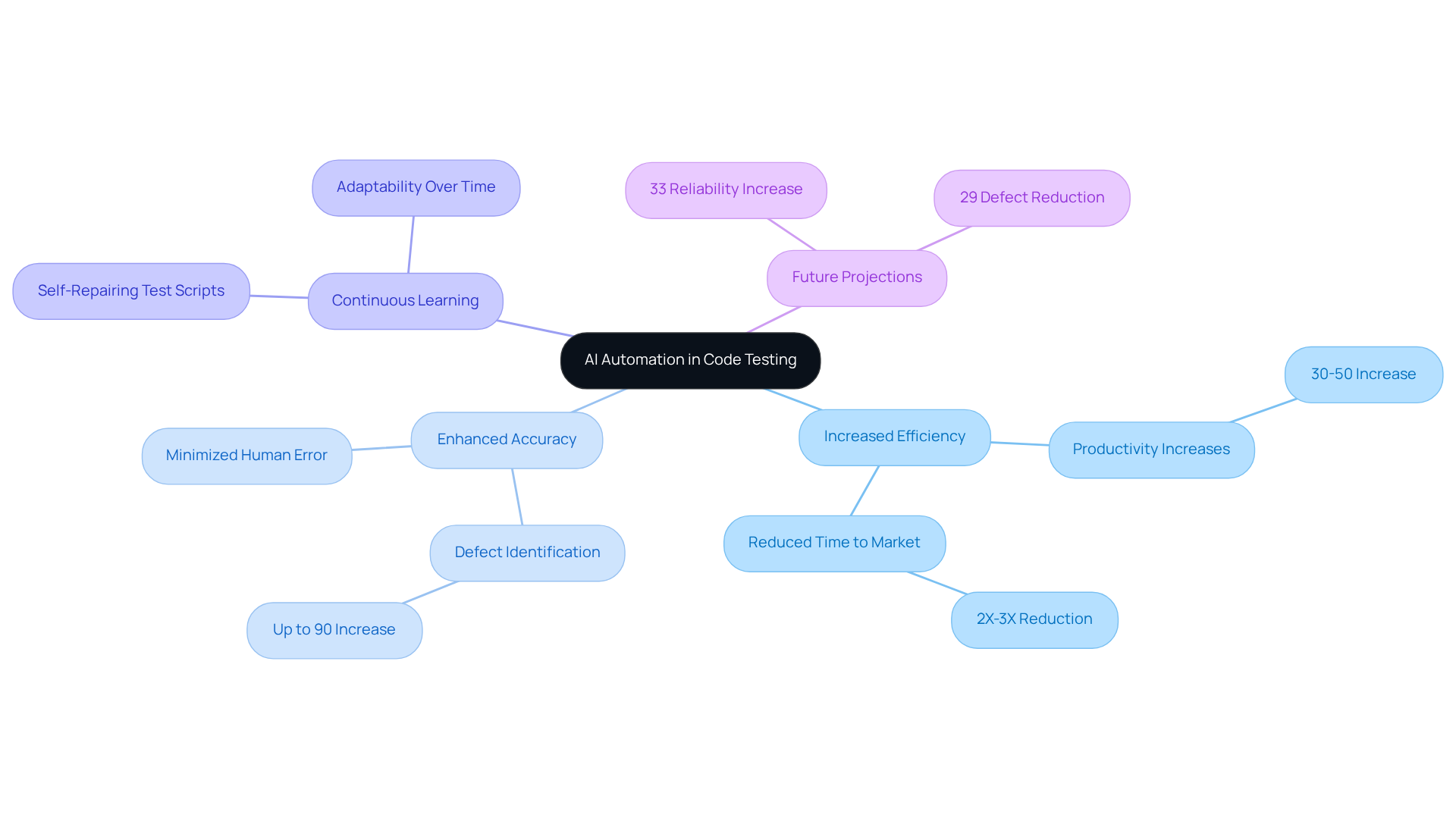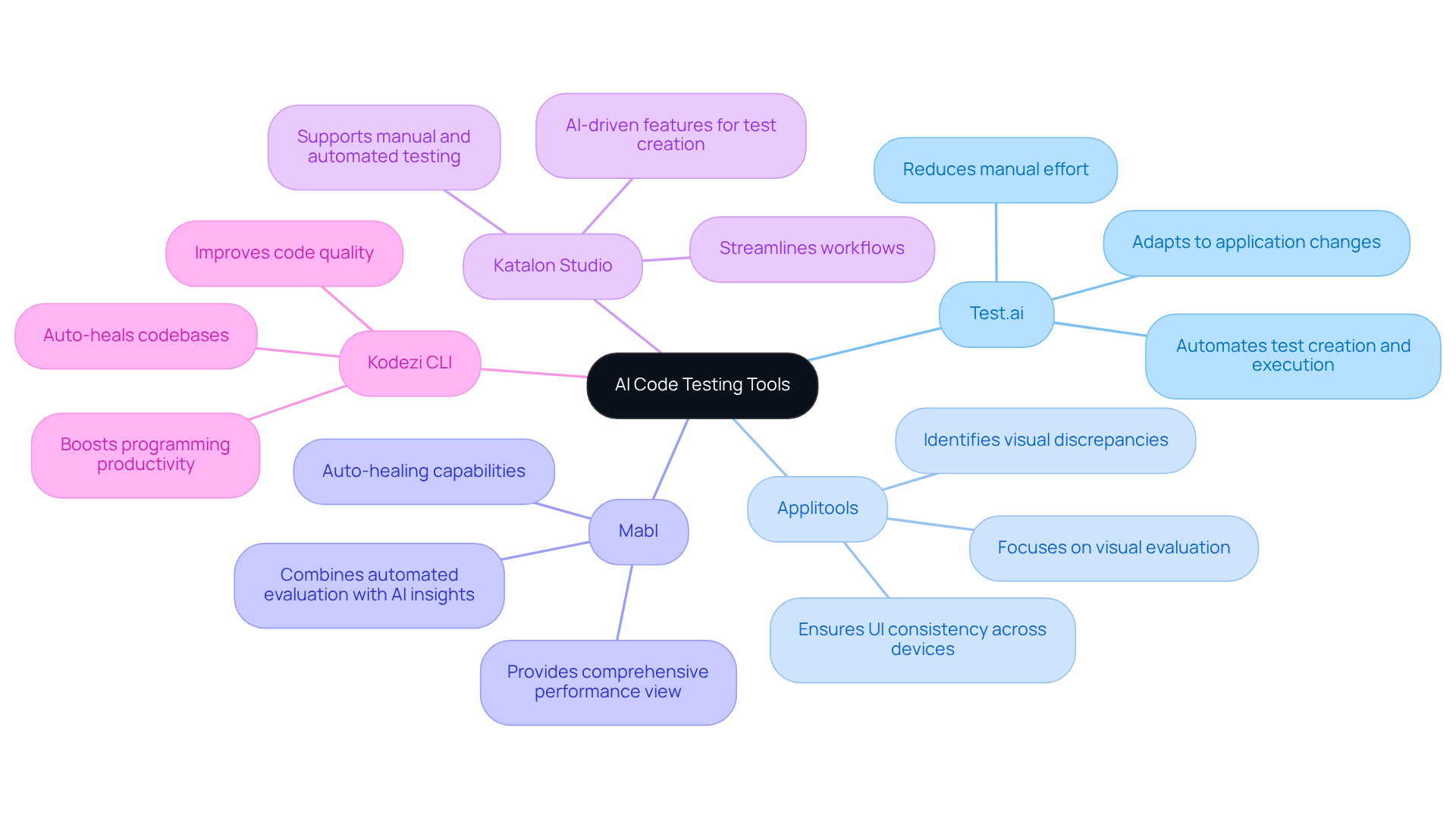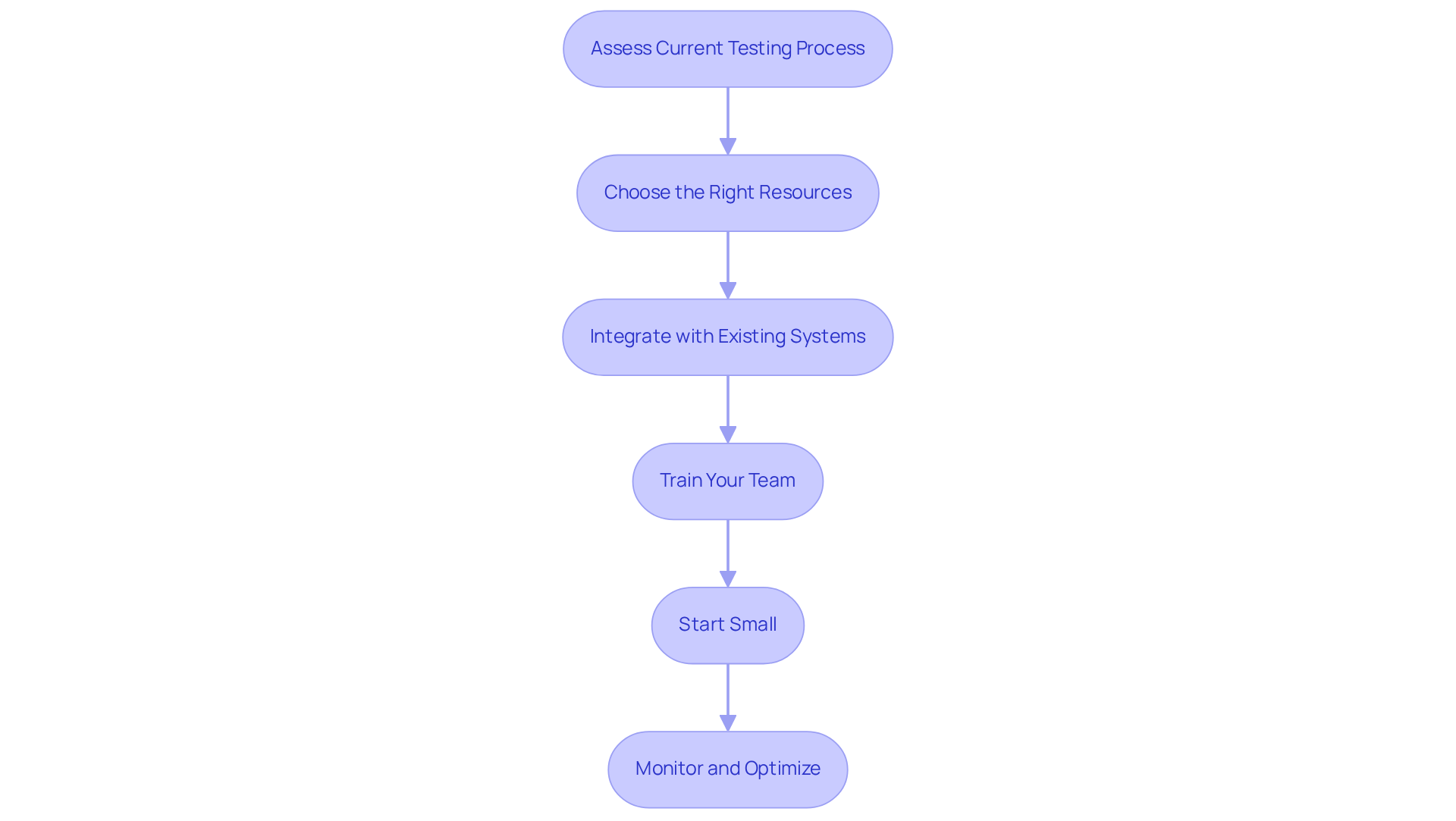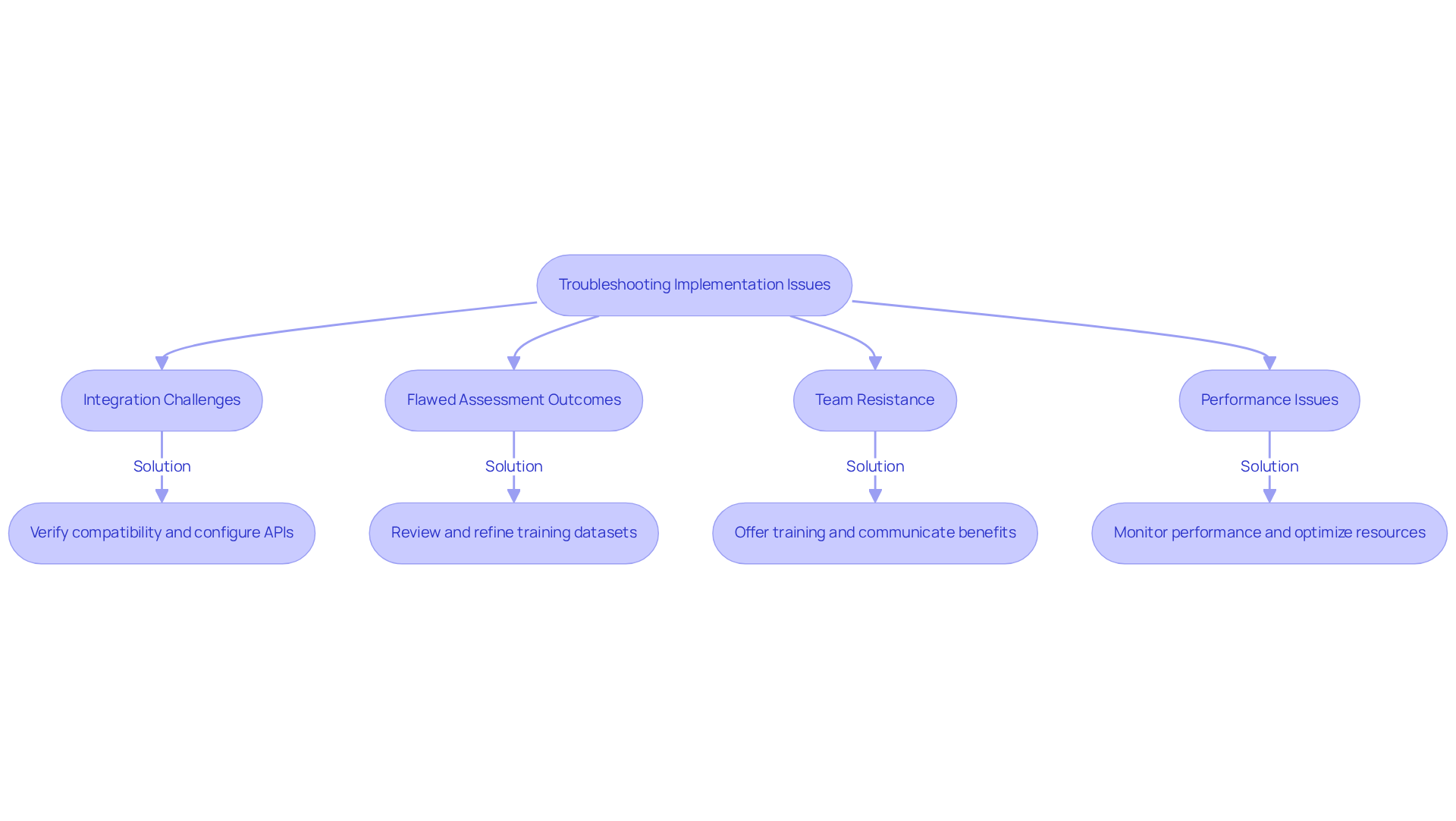Overview
Coding challenges are a common hurdle that developers face in today’s fast-paced software environment. How can these challenges be effectively addressed? Kodezi offers a solution with its innovative AI automation tools designed specifically for code testing.
By leveraging AI-driven solutions, Kodezi significantly enhances efficiency and accuracy in software evaluation. Teams adopting these technologies have reported increased defect detection rates and notable productivity improvements.
Imagine being able to streamline your testing processes while improving code quality. With Kodezi, you can experience these benefits firsthand. The platform not only simplifies testing but also empowers developers to focus on what truly matters—creating robust software.
Are you ready to transform your coding practices? Explore the powerful tools available on the Kodezi platform and take the first step towards mastering AI automation for code testing.
Introduction
In the realm of software development, the relentless pace of innovation often leaves developers grappling with the complexities of code evaluation. How can teams effectively navigate these challenges? Enter AI automation in code testing, a transformative approach that harnesses the power of artificial intelligence to streamline and enhance the testing process. This guide unveils the myriad benefits of integrating AI into testing workflows, from increased efficiency and accuracy to continuous learning capabilities.
Yet, as organizations rush to adopt these cutting-edge technologies, they face pressing questions:
- What common challenges might arise?
- How can they be overcome?
The answers lie ahead, promising a clearer path to mastering AI-driven code testing. Furthermore, Kodezi addresses these challenges with specific features designed to improve productivity and code quality.
Imagine a testing environment where efficiency gains are not just a goal but a reality. By utilizing Kodezi, teams can experience significant improvements in their workflows. In addition, the continuous learning capabilities of AI ensure that testing processes evolve alongside the code itself.
As you explore the tools available on the platform, consider how Kodezi can transform your approach to code testing. Are you ready to enhance your coding practices and achieve higher quality results? The journey to mastering AI-driven code testing begins now.
Understand AI Automation in Code Testing
In today's fast-paced development environment, coding challenges are a constant hurdle for developers. AI automate code testing leverages artificial intelligence technologies to simplify and enhance the software application evaluation process. By employing machine learning algorithms and data analysis methods, AI can automatically identify bugs, improve case scenarios, and significantly boost overall evaluation efficiency. For instance, AI analyzes historical data from past assessments to predict potential failures, prioritize evaluation efforts, and generate new assessment scenarios based on code modifications. This understanding is vital for teams looking to implement AI-driven solutions effectively.
Key benefits of AI automation in code testing include:
- Increased Efficiency: AI executes tests faster than manual processes, leading to quicker feedback loops. Companies that scaled Agile development have reported productivity increases of 30%-50% and reduced time to market by 2X-3X.
- Enhanced Accuracy: By minimizing human error, AI can automate code testing to ensure more reliable evaluation outcomes, which is crucial since this approach can increase defect identification by up to 90% compared to manual evaluation.
- Continuous Learning: AI systems utilize the ability to automate code testing by learning from past evaluation results, which improves their effectiveness over time. This adaptability is essential as AI applications can self-repair test scripts when UI changes occur, thereby reducing maintenance challenges.
Looking ahead, the incorporation of AI in software evaluation is projected to grow significantly by 2025, with AI resources enhancing reliability by 33% and decreasing defects by 29%. As organizations increasingly embrace AI-assisted evaluation methodologies, the transformation of traditional assessment practices becomes clear, making them more adaptive and responsive to the complexities of modern codebases.

Explore Tools for AI Code Testing Automation
In the fast-evolving landscape of software development, developers frequently encounter challenges related to code evaluation. The good news? AI automate code testing is here to assist. By integrating powerful tools into your workflow, you can streamline processes and enhance productivity.
-
Test.ai stands out as an innovative solution that automates the creation and execution of tests. It dynamically adapts to changes in the application environment, significantly reducing manual effort and improving evaluation efficiency.
-
Applitools is renowned for its focus on visual evaluation. This tool employs AI to ensure UI elements display accurately across various devices and browsers, making it invaluable for maintaining consistent user experiences by identifying even the smallest visual discrepancies.
-
Mabl combines automated evaluation with AI insights, providing a comprehensive view of application performance and user experience. Its auto-healing capabilities ensure that evaluations remain stable as the application evolves, making it a reliable choice for continuous integration environments.
-
Katalon Studio offers versatility by supporting both manual and automated testing. Its AI-driven features enhance test creation and execution, allowing teams to streamline workflows while upholding high-quality standards.
-
Kodezi CLI acts as a Swiss-Army knife for programmers, empowering teams to auto-heal codebases and boost programming productivity. It autonomously improves code quality and fixes bugs before they reach production, making it an essential asset for B2B engineering teams. Why not experience the benefits of Kodezi CLI by signing up for a free trial or scheduling a demo today?
Each of these tools presents unique features that can elevate your evaluation processes by utilizing ai automate code testing. When considering which to implement, evaluate them based on your team's specific needs, such as integration capabilities, user-friendliness, and compatibility with your existing technology stack. With 82% of developers reporting weekly use of AI tools, adopting these technologies is becoming increasingly crucial for efficient software development.

Implement AI Automation in Your Testing Workflow
To effectively implement AI automation in your testing workflow, consider the following steps:
-
Assess Your Current Testing Process: Identify bottlenecks and areas where automation can deliver the most value. Statistics indicate that 85% of development managers find it progressively difficult to provide innovation without sacrificing quality, emphasizing the necessity for effective evaluation processes.
-
Choose the Right Resources: Select AI testing instruments that align with your needs and technology stack. Kodezi CLI, for example, functions as a versatile resource for B2B engineering teams, independently enhancing code quality and resolving bugs before they reach production. With 90% of enterprises acknowledging that AI automating code testing is vital for digital transformation, selecting the appropriate resources, such as Kodezi, is critical for success.
-
Integrate with Existing Systems: Ensure that your chosen solutions can seamlessly connect with CI/CD pipelines and version control systems like GitHub. This integration is vital, as 54% of developers are adopting DevOps practices to accelerate development cycles.
-
Train Your Team: Conduct training sessions to familiarize your team with the new resources and processes, ensuring everyone is on board. Kodezi's user-friendly interface and detailed documentation can greatly improve the usage of AI tools, as 39% of teams report efficiency gains from processes that AI automate code testing.
-
Start Small: Begin by automating a few test cases to evaluate effectiveness and make necessary adjustments. This incremental method enables manageable modifications and assists in reducing risks linked to larger-scale systems. Kodezi can assist in this phase by automatically analyzing and correcting code, making it easier to implement changes.
-
Monitor and Optimize: Continuously observe the performance of your AI systems, including Kodezi, and refine them based on feedback and outcomes. Regular optimization is crucial, as 77% of companies have embraced some form of automated software evaluation, highlighting the necessity of continuous enhancement. Kodezi's capabilities in bug analysis and code optimization can play a crucial role in this ongoing process.
By adhering to these steps and utilizing resources such as Kodezi, you can effectively integrate processes that AI automate code testing into your evaluation workflow, resulting in increased efficiency and better code quality.

Troubleshoot Common Implementation Issues
The challenges that developers frequently encounter can arise when implementing AI to automate code testing. However, addressing these issues is essential for enhancing productivity and software quality. Kodezi offers effective solutions to these common challenges, facilitating the integration of AI to automate code testing into the testing processes, making them smoother and more efficient.
Integration Challenges: If your AI tools struggle to integrate with existing systems, verify compatibility and ensure that all necessary APIs are correctly configured. This step is essential, as 85% of organizations are now employing cloud-based automation solutions, which can enhance integration processes. Kodezi, with its AI-assisted development tool, can help AI automate code testing during the debugging process. It provides real-time bug analysis and corrections while optimizing code and generating comments, making integration smoother.
Flawed Assessment Outcomes: Unforeseen evaluation failures may suggest problems with the AI model's training data. Reviewing and refining the training datasets and adjusting model parameters can enhance accuracy. Notably, AI to automate code testing can enhance defect detection by up to 90% compared to manual testing, underscoring the importance of precise configurations. Kodezi's ability to automatically analyze and fix bugs can significantly improve the reliability of test results.
Team Resistance: Resistance from team members can hinder the adoption of new tools. To encourage acceptance, offer thorough training and clearly convey the advantages of AI integration, such as decreasing feedback response time by up to 80%, which can greatly improve project management. Furthermore, 60% of organizations utilizing testing processes report substantial enhancements in application quality, encouraging teams to accept these changes. Kodezi's user-friendly interface and clear explanations of bug fixes can ease the transition for teams.
Performance Issues: Monitoring system performance and resource utilization closely is crucial. If AI tools are causing slowdowns in your CI/CD pipeline, consider optimizing your infrastructure or scaling resources. With 39% of teams indicating efficiency improvements from AI-driven evaluation processes, and 42% of large organizations actively utilizing AI in assessment workflows, ensuring optimal performance is vital for maximizing these advantages. Kodezi's lightweight AI engine runs in the browser, minimizing resource strain while enhancing coding efficiency.
By proactively addressing these challenges, you can facilitate a smoother implementation of AI to automate code testing in your testing processes. Ultimately, this leads to improved software quality and accelerated development cycles. Explore the tools available on the Kodezi platform to enhance your coding practices today.

Conclusion
Mastering AI automation in code testing signifies a transformative shift in software evaluation practices. Coding challenges that developers face can often hinder productivity and quality. However, by leveraging artificial intelligence, development teams can significantly enhance their testing processes, resulting in faster, more accurate evaluations that ultimately lead to higher software quality. This evolution streamlines workflows and empowers teams to focus on innovation rather than getting bogged down by manual testing challenges.
In this context, tools such as Test.ai, Applitools, Mabl, Katalon Studio, and Kodezi CLI emerge as vital resources for integrating AI into testing workflows. These tools not only address common pain points but also introduce specific features that enhance efficiency, accuracy, and continuous learning capabilities. Furthermore, practical steps for implementation, from assessing current processes to troubleshooting common issues, are essential for helping teams navigate this transition effectively.
Embracing AI automation in code testing is not merely a trend; it is a necessary evolution for organizations striving to remain competitive in a rapidly changing tech landscape. By adopting these advanced methodologies, teams can improve their testing outcomes and foster a culture of continuous improvement and innovation. The future of software evaluation is here, powered by AI—taking the first step towards integration can lead to remarkable advancements in productivity and quality. Are you ready to explore the tools available on the platform and elevate your coding practices?
Frequently Asked Questions
What is AI automation in code testing?
AI automation in code testing leverages artificial intelligence technologies to simplify and enhance the software application evaluation process by automatically identifying bugs, improving case scenarios, and boosting overall evaluation efficiency.
How does AI improve the efficiency of code testing?
AI executes tests faster than manual processes, leading to quicker feedback loops. Companies using AI in Agile development have reported productivity increases of 30%-50% and a reduction in time to market by 2X-3X.
What is the impact of AI on the accuracy of code testing?
AI minimizes human error in code testing, ensuring more reliable evaluation outcomes. This approach can increase defect identification by up to 90% compared to manual evaluation.
How does AI contribute to continuous learning in code testing?
AI systems learn from past evaluation results, improving their effectiveness over time. They can adapt to changes by self-repairing test scripts when UI changes occur, reducing maintenance challenges.
What are the projected benefits of AI in software evaluation by 2025?
By 2025, the incorporation of AI in software evaluation is expected to enhance reliability by 33% and decrease defects by 29%, transforming traditional assessment practices to be more adaptive and responsive to modern code complexities.




